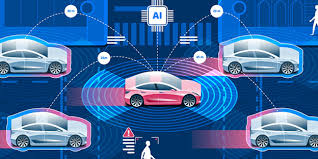Legislation on the protection of human rights in autonomous vehicles
Autonomous vehicles (AVs), which can move without human intervention, are becoming more and more relevant every year. They promise significant benefits, including improved road safety and reduced emissions. However, their implementation also creates numerous legal, ethical and social challenges, especially in the context of human rights protection. Let's take a look at the main aspects of the legislation governing this sector.
Key legal aspects
Protection of personal data
Autonomous vehicles collect a large amount of data, including information about routes, speed, and personal data of passengers and other road users. Personal data protection legislation should ensure the following:
- Data collection and processing: Data should be collected and processed only to the extent necessary for the operation of the automated vehicle.
- Data anonymization: Personal data should be anonymized to minimize the risks of privacy breaches.
- Consent to data collection: Passengers must be informed and consent to the collection and processing of their personal data.
Transparency and responsibility
- Transparency of algorithms: Developers of autonomous vehicles should ensure that the algorithms used to make decisions are explainable. This is important for understanding how and why certain decisions are made.
- Liability: Legislation should clearly define who is liable in the event of accidents or other incidents involving motor vehicles - manufacturers, operators or owners. You may be interested in the following articles: legal advice, legal advice, analysis of documents, legal analysis of the situation, written advice, verification of documents by a lawyer, lawyers documents, online legal advice, online lawyer, legal opinion, legal opinion of a lawyer, lawyer online.
Security and ethical aspects
- Road safety: Vehicles must meet high safety standards, including regular technical inspections and certification.
- Ethical dilemmas: Legislation should take into account ethical aspects, such as decision-making in emergency situations where conflicts between different road users are possible.
International experience
European Union
The EU is actively working to create a regulatory framework for AVs. In 2020, the European Commission presented the EU Road Safety Strategy, which aims to make roads safer, including through the introduction of autonomous vehicles. The main elements include:
- European Regulation on the safety of vehicles: Safety requirements to be met by motor vehicles.
- GDPR: General Data Protection Regulation, which regulates the collection and processing of personal data.
USA
In the United States, autonomous vehicles are regulated at the federal and state levels. The Federal Highway Traffic Safety Administration (NHTSA) has issued several guidelines and regulations, including:
- Federal Automated Vehicles Policy: Recommendations for manufacturers on testing and implementation of automated vehicles.
- California Autonomous Vehicle Regulations: California is one of the leaders in the field of testing and regulating AVs.
Legislation of Ukraine
Ukraine is currently in the process of developing a regulatory framework for autonomous vehicles. The main areas of regulation include:
- The Law on Road Traffic: Possible changes to take into account the specifics of autonomous vehicles.
- The Law on Personal Data Protection: Requirements for processing data collected by autonomous vehicles.
- Ethical and security standards:
Prospects for the development of legislation in Ukraine
Development of special legislation
In order to ensure comprehensive regulation of autonomous vehicles in Ukraine, it is necessary to develop special legislation that will include:
- Clear definition of terms: The legislation should contain clear definitions of terms such as "autonomous vehicle", "level of autonomy", etc.
- Regulation of testing and implementation: Setting requirements for testing autonomous vehicles on public roads, including safety and insurance requirements.
- Liability: Clearly define the responsibilities of different actors, including manufacturers, operators, and owners of autonomous vehicles.
Integration of international standards
Ukraine should be guided by international experience and standards, such as:
- ISO 26262: International Standard for the functional safety of electrical and electronic systems in road vehicles.
- UNECE WP.29: UN Working Party on Vehicles, which develops regulations to ensure the safety of autonomous vehicles.
Cooperation with international organizations
Cooperation with international organizations, such as the European Union, the United Nations, and others, will help to implement best practices and standards in the field of autonomous vehicles.
Education and awareness raising
For the successful introduction of autonomous vehicles, it is necessary to raise public awareness of their benefits and risks. This includes:
- Public campaigns: Informing the public about the safety and efficiency of autonomous vehicles.
- Professional education: Training of specialists in the field of development, testing and maintenance of autonomous vehicles.
Conclusion.
Autonomous vehicles have the potential to significantly change the transportation sector by improving road safety and efficiency. However, their introduction requires careful regulation at the legislative level to ensure the protection of human rights, safety and privacy. Ukraine is well positioned to become a leader in this area by utilizing international experience and developing its own innovative solutions and regulations.

































